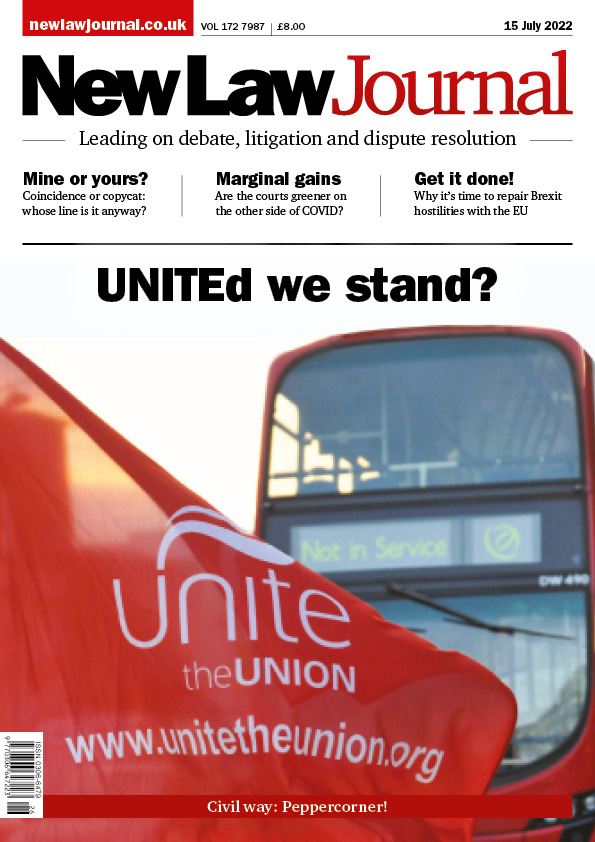THIS ISSUE

Ground rents get corny; That silky feeling; Distance law; Service charge dispute costs; Revised civil forms
The COVID-19 pandemic had a side-effect of making the justice system and litigation management more environmentally sound and sustainable. How can we maintain the gains post-pandemic?
Can Boris Johnson’s successor repair ‘the damage that has been done to the UK’s reputation in law’?
The judiciary and Ministry of Justice intend to make it easier for judges to move from one practice area to another, ‘removing barriers that prevent judges with appropriate authorisation from hearing different types of cases’
Divided opinions over fairness to students
Criminal barristers have entered their third week of strike action, downing tools from Monday to Thursday, and enduring uncomfortable temperatures to protest outside Birmingham, Preston and Plymouth Crown Courts and the Supreme Court in London
The Supreme Court handed down 56 judgments while the Judicial Committee of the Privy Council gave 34 judgments in 2021-22, according to their annual report and accounts, laid in Parliament this week
The Ministry of Justice (MoJ) has a temporary team in charge until at least 5 September, when Prime Minister Boris Johnson is expected to give way to a new leader of the Conservative Party
Former District Judge Stephen Gold casts a judge’s eye on remote observation and recording of cases
Not guilty by reason of insanity is one of the oldest principles of criminal law. In the 2022 case of R v Keal, the Court of Appeal (Criminal Division) revisited the M’Naghten rules, which stem from 1843
MOVERS & SHAKERS

Carey Olsen—Kim Paiva
Group partner joins Guernsey banking and finance practice
.tmb-mov69x69.jpg?sfvrsn=16d9dd3d_1)
Morgan Lewis—Kat Gibson
London labour and employment team announces partner hire

Foot Anstey McKees—Chris Milligan & Michael Kelly
Double partner appointment marks Belfast expansion
NEWS
The Ministry of Justice (MoJ) has not done enough to protect the future sustainability of the legal aid market, MPs have warned
Writing in NLJ this week, NLJ columnist Dominic Regan surveys a landscape marked by leapfrog appeals, costs skirmishes and notable retirements. With an appeal in Mazur due to be heard next month, Regan notes that uncertainties remain over who will intervene, and hopes for the involvement of the Lady Chief Justice and the Master of the Rolls in deciding the all-important outcome
After the Southport murders and the misinformation that followed, contempt of court law has come under intense scrutiny. In this week's NLJ, Lawrence McNamara and Lauren Schaefer of the Law Commission unpack proposals aimed at restoring clarity without sacrificing fair trial rights
The latest Home Office figures confirm that stop and search remains both controversial and diminished. Writing in NLJ this week, Neil Parpworth of De Montfort University analyses data showing historically low use of s 1 PACE powers, with drugs searches dominating what remains
Boris Johnson’s 2019 attempt to shut down Parliament remains a constitutional cautionary tale. The move, framed as a routine exercise of the royal prerogative, was in truth an extraordinary effort to sideline Parliament at the height of the Brexit crisis. Writing in NLJ this week, Professor Graham Zellick KC dissects how prorogation was wrongly assumed to be beyond judicial scrutiny, only for the Supreme Court to intervene unanimously








